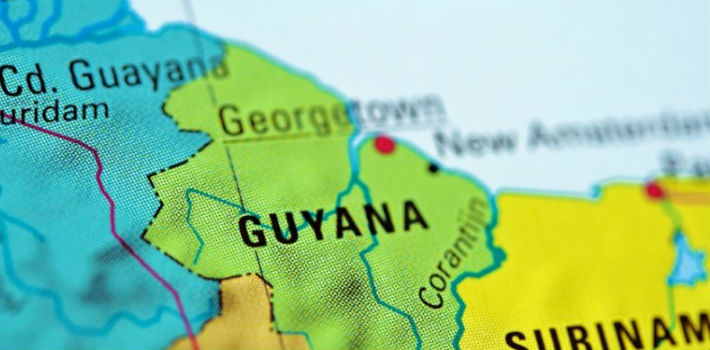
EspañolA century-old territorial dispute between South American neighbors Venezuela and Guyana has erupted into a war of words, as the latter gears up to begin oil exploration in disputed waters this March.
On Saturday, February 28, the government of Guyana issued a warning to Venezuela to “desist” from interfering in its exploration of petroleum deposits in maritime territory claimed by both countries.
“The Ministry of Foreign Affairs has requested that the Government of the Bolivarian Republic of Venezuela desist from taking any actions that could only result in the stymieing of the development of Guyana and its people and that would be in contravention of international law,” read a statement issued by Georgetown.
The anglophone nation of some 800,000 inhabitants announced that it had already informed the Caribbean Community (Caricom), the Union of South American Nations (Unasur), the Organization of American States, the Commonwealth, and the UN secretary general about recent Venezuelan actions.
Guyana’s demand comes after the Venezuelan Foreign Ministry complained on December 30, 2014, that Guyanese Foreign Minister Carolyn Rodrígues-Birkett had made unhelpful statements about the ongoing maritime dispute involving waters off Esequibo, western Guyana, which Venezuela also claims. The Venezuelan government alleged that its counterparts in Guyana weren’t respecting diplomatic channels to resolve the issue amicably.
Guyana has awarded Exxon Mobil a concession worth US$200 million to explore a petroleum well in the Liza field beginning this month, in an area which Venezuela claims as its own.
Colonel Pompeyo Torrealba, former chief of the Special Unit for Esequibo in the Venezuelan Foreign Ministry, told the PanAm Post that Venezuela isn’t opposed to the development of Guyana, but argued that the two countries should first resolve the land dispute over the Esequibo territory before delimiting maritime borders.
Esequibo, a 168,000 square kilometer region about the size of the US state of Georgia, is currently administered by Guyana, despite being described by Venezuela as a “reclamation zone.”
Atlantic Exit Fears
Sadio Garavini, a Venezuelan professor of political science, explained that the controversy has arisen over Guyana’s aim to develop and explore the continental shelf in its maritime Exclusive Economic Zone (EEZ).
He claimed that Guyana has unilaterally fixed the border as lying on a north-west parallel between Esequibo and Delta Amacuro State, eastern Venezuela. As a result, the extension of the border demarcation 200 miles out to sea is inclined towards the west, meaning that Venezuela is denied sovereignty of thousands of square kilometers of the Atlantic Ocean lying close to its shores.
“Losing an exit to the Atlantic, means economically losing hundreds of thousands of square kilometers of marine and submarine areas rich in fishing stocks and hydrocarbons. And from the geopolitical point of view, a free exit to the Atlantic is important so Venezuelan ships don’t have to pass through seas under the jurisdiction of other countries; it’s a free exit towards the high sea,” Garavini explained.
Garavini argued that Venezuela should first declare that the issue of the “exit to the Atlantic” is non-negotiable; secondly, that the Venezuelan navy should maintain patrols in the disputed area; and finally that a full-time negotiator should be appointed by Caracas.
Guyana “Undermining” Geneva Treaty
International Law expert María Teresa Belandria suggested that “perhaps Guyana feels that the Venezuelan government isn’t disposed to carry out other activities, such as those taken by the Venezuelan Navy against the [oil exploration] ship Teknik Perdana in 2013, when it was detected in Venezuelan waters. It was intercepted according to protocol and brought to Nueva Esparta state, where it was briefly detained.”
Belandria called on the Venezuelan government to be “much firmer” and bring the issue to a “formal protest” against the Guyana government.
According to Belandria, Guyana “doesn’t have the power to ask Venezuela not to place obstacles in the way of its economic development, given that this is territory in dispute with Venezuela.”
She added that Guyana “can’t offer concessions to explore or exploit any kind of minerals or resources in the disputed zone, according to the [1966] Treaty of Geneva, as it could undermine Venezuela’s rights.”
For Garavini, this agreement hasn’t worked for the past 20 years, and noted that Guyana has the intention of solving the issue with a ruling from the International Court of Justice.
Exchanging Sovereignty for Socialism
During his first term in office (1999-2006), the late Venezuelan President Hugo Chávez largely maintained the policy of his predecessors with regard to the claim for the territory. However, in a 2004 visit to Guyana, he said in a speech that “the Esequibo issue will be eliminated by [greater] social, political, and economic relations between the two countries.”
Garavini argued that “Venezuela has taken a passive position in the last decade due to the megalomania of former President Chávez, and his ideological blindness.”
He added that Chávez’s socialist ideas prevented him from thinking about the permanent interests of the Venezuelan state with regard to its sovereignty. According to the university professor, “the late president thought that the Venezuelan claim, from the beginning, was the product of the North American empire wanting to destabilize a leftist government in Guyana,” describing it as “an idiocy” because at that time Guyana was a British colony.
“Chávez wanted to have a global foreign policy, he wanted to get the support of the English-speaking Caribbean, and that’s why he assumed a passive position,” he added.
But the situation has since become more complicated. “The poor relations and hostility that the Venezuelan government has had with the United States has meant that the North American government, through its commercial attaché in Guyana, has recognized the right of that country to explore its continental platform, and that it would support Exxon in its exploration.”
However, the analyst concluded that Washington has so far maintained a neutral position in the dispute.
 Versión Español
Versión Español












